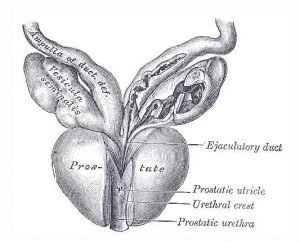
Prostate Gray’s Anatomy
A Penn study of more than 150,000 men with prostate cancer shows androgen deprivation therapy was associated with a higher likelihood of developing dementia when compared to patients who were not exposed to the treatment, confirming the results of a previous 2015 work by researchers of the Stanford University School of Medicine and the University of Pennsylvania Perelman School of Medicine Link….
Of the 154,089 men sampled in the study, 62,330 received ADT within two years of their prostate cancer diagnosis and 91,759 did not.
Of the patients with prostate cancer who received the hormone therapy, 13 percent were later diagnosed with Alzheimer’s disease, compared to 9 percent who did not receive ADT.
For dementia, those numbers widened: 22 percent of prostate cancer patients who received ADT were diagnosed with dementia, compared to 16 percent who did not receive the therapy.
This research builds on previous, smaller studies which showed similar correlations between hormone therapy and cognitive risks in patients with prostate cancer.
The lifetime risk for Alzheimer’s dementia for men overall is 12 percent, according to data from the Framingham Heart Study.
“To our knowledge, this is one of the largest studies to date examining this association, and it followed patients for an average of eight years after their prostate cancer diagnosis.
Our results suggest that clinicians need to raise their awareness about potential long-term cognitive effects of hormone therapy and discuss these risks with their patients,” said the study’s principal investigator Ravishankar Jayadevappa, PhD, a research associate professor of Geriatrics and senior fellow in the Leonard Davis Institute of Health Economics.
Prostate cancer is the most commonly diagnosed non-skin cancer in the United States and the second leading cause of cancer death in American men.
ADT, or hormone therapy, has been shown to dramatically reduce the spread and progression of the disease.
The treatment works by reducing levels of male hormones in the body, called androgens, to stop them from stimulating prostate cancer cells to grow.
It is typically used in patients who have an advanced state of the disease, when the cancer has metastasized, or in those with a high risk of recurrence after their initial treatment.
Despite the benefits of ADT, its use has faced controversy, as some evidence suggests that decreasing androgen levels may increase risk factors for Alzheimer’s and dementia, including loss of lean body mass, diabetes, cardiovascular disease, and depression.
Hormone therapy may also affect cognitive function by impairing neuron growth and the regeneration of axons.
After controlling for several factors, such as other medical conditions, disease severity and sociodemographic characteristics — like age and marital status — the Penn researchers determined the hazard ratio for prostate cancer patients who receive hormone therapy.
A hazard ratio measures the effect of an intervention over time.
With all other factors remaining equal, the research team determined that patients with prostate cancer who receive hormone therapy face a hazard ratio that translate to a 14 percent increased risk of developing Alzheimer’s and a 20 percent increased risk of dementia, when compared to other prostate cancer patients who are not exposed to ADT.
The Penn study contrasts with results from several recent papers that have examined the association — or lack thereof — between ADT and dementia.
These past studies relied on data from a single institution, while others fail to adjust for cancer stage, ADT dose, and duration.
Many examined a small cohort of patients and only for a short amount of time following their treatment.
By contrast, Jayadevappa’s team used data from the Surveillance, Epidemiology, and End Results (SEER)-Medicare linked database of the National Cancer Institute, which brings together Medicare administrative claims data and clinical tumor registry data from 18 different sites, encompassing 28 percent of the U.S. population.
For their retrospective study, the Penn researchers collected data from a sample of men ages 66 years and older with localized or advanced prostate cancer who were diagnosed between 1996 and 2003.
The team noted more research is necessary to understand the possible biological mechanisms that underlie the link between dementia and ADT.
As to whether physicians should advise their patients regarding the risk of hormone therapy, it may depend on the patient and the severity of his or her disease, cautioned study co-author Thomas Guzzo, MD, MPH, chief of Urology.
“I think we need to look at these patients on an individual level. Certainly there are patients who need hormonal therapy and benefit from it greatly,” Guzzo said.
“There are others where the evidence is less clear, and in these patients, we should strongly consider the risk of hormonal therapy versus the benefit in treating their prostate cancer. This should be a shared decision-making process with the patient.”
Additional Penn authors include: Sumedha Chhatre, Bruce Malkowicz, Ravi B. Parikh, and Alan J. Wein.
See also:
Prostate cancer, androgen blockers and cognitive decline (2015-12-15)
Link…
Testosterone slows prostate cancer recurrence in low-risk patients (2019-03-30)
Link…
For more information
Oncology
Association Between Androgen Deprivation Therapy Use and Diagnosis of Dementia in Men With Prostate Cancer
Link…
University of Pennsylvania
Link…
MDN
This post is also available in:
 Italian
Italian


